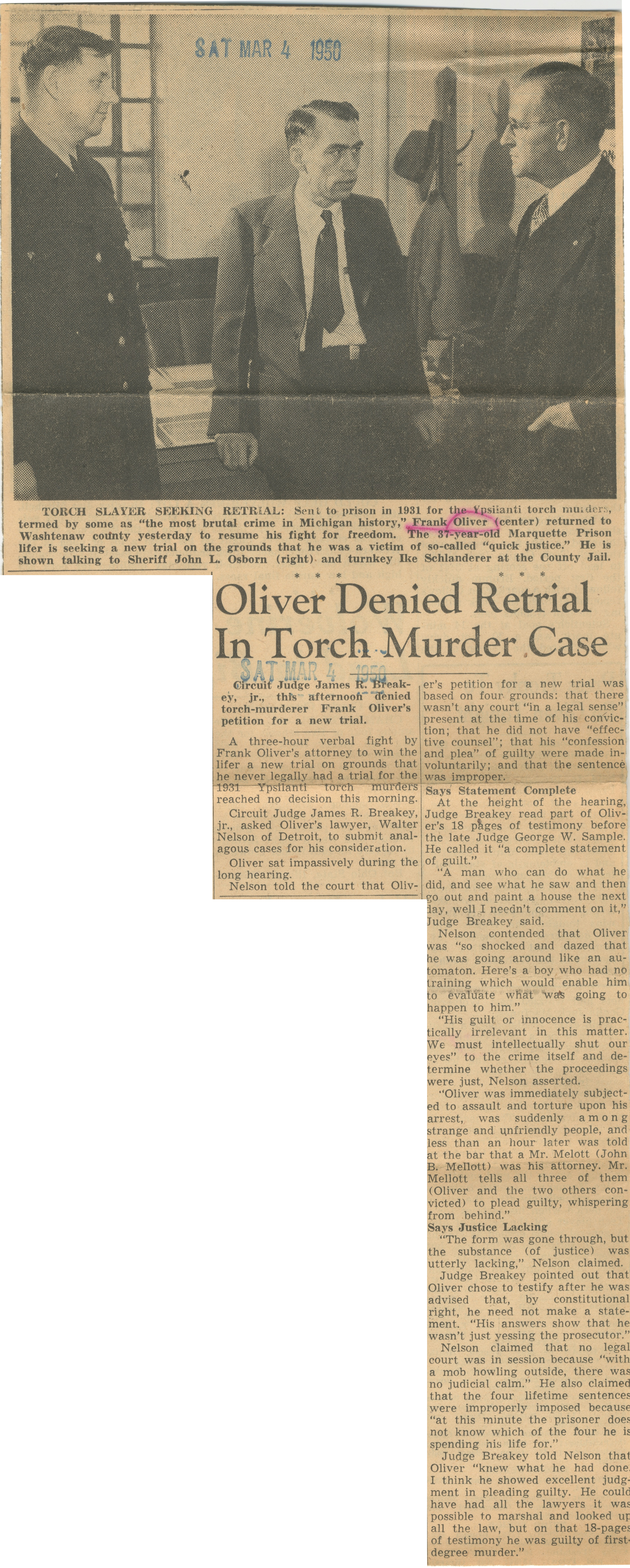Oliver Denied Retrial In Torch Murder Case

TOUCH SLAVER SEEKING RETRIAL: Sent to prison in 1931 for the Ypsilanti torch murders, termed by some as "the most brutal crime in Michigan history," Frank Oliver (center) returned to Washtenaw county yesterday to resume his fight for freedom. The 37-year-old Marquette Prison lifer is seeking a new trial on the grounds that he was a victim of so-called "quick-justice." He is shown talking to Sheriff John L. Osborn (right) and turnkey Ike Schlanderer at the County Jail.
Oliver Denied Retrial In Torch Murder Case
Circuit Judge James R. Breakey, jr., this afternoon denied torch-murderer Frank Oliver's petition for a new trial.
A three-hour verbal fight by Frank Oliver's attorney to win the lifer a new trial on grounds that he never legally had a trial for the 1931 Ypsilanti torch murders reached no decision this morning.
Circuit Judge James R. Breakey, jr., asked Oliver's lawyer, Walter Nelson of Detroit, to submit analagous cases for his consideration.
Oliver sat impassively during the long hearing.
Nelson told the court that Oliv-
er's petition for a new trial was based on four grounds: that there wasn't any court "in a legal sense" present at the time of his conviction; that he did not have "effective counsel"; the his "confession and plea" of guilty were made involuntarily; and that the sentence was improper.
Says Statement Complete
At the height of the hearing, Judge Breakey read part of Oliver's 18 pages of testimony before the late Judge George W. Sample. He called it "a complete statement of guilt."
"A man who can do what he did, and see what he saw and then go out and paint a house the next day, well I needn't comment on it," Judge Breakey said.
Nelson contended that Oliver was "so shocked and dazed that he was going around like an automaton. Here's a boy who had no training which would enable him to evaluate what was going to happen to him."
"His guilt or innocence is practically irrelevant in this matter. We must intellectually shut out eyes" to the crime itself and determine whether the proceedings were just, Nelson asserted.
"Oliver was immediately subjected to assault and torture upon his arrest, was suddenly among strange and unfriendly people, and less than an hour later was told at the bar that a Mr. Melott (John B. Mellott) was his attorney. Mr. Mellott tells all three of them (Oliver and the two others convicted) to plead guilty, whispering from behind."
Says Justice Lacking
"The form was gone through, but the substance (of justice) was utterly lacking," Nelson claimed.
Judge Breakey pointed out that Oliver chose to testify after he was advised that, by constitutional right, he need not make a statement. "His answers show that he wasn't just yessing the prosecutor."
Nelson claimed that no legal court was in session because "with a mob howling outside, there was no judicial calm." He also claimed that the four lifetime sentences were improperly imposed because "at this minute the prisoner does not know which of the four he is spending his life for."
Judge Breakey told Nelson that Oliver "knew what he had done. I think he showed excellent judgment in pleading guilty. He could have had all the lawyers it was possible to marshal and looked up all the law, but on that 18-pages of testimony he was guilty of first-degree murder."